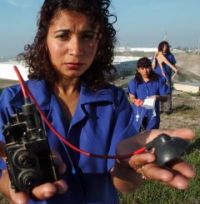Get out your day planners, people. On Tuesday, Oct. 10, (that’s next week) at 10 p.m. (but don’t trust me, check your local listings) PBS partners with Grist to present Maquilapolis, a documentary about the hidden costs of cheap electronics and the realities of life for Mexican maquiladora workers. (And you thought I was only interested in brain–numbing reality television …)

The term “Maquilapolis” refers to the “city of factories” in Tijuana, Mexico, where huge warehouses turn out televisions, electrical cables, toys, clothes, batteries, and medical equipment. And the film is focused on the workers in those factories: women like Carmen Durán (pictured at left, photo: David Maung). From the film’s website, here’s a brief glimpse at what life is like for Carmen and other maquiladora workers:
Carmen works the graveyard shift in one of Tijuana’s maquiladoras, the multinationally owned factories that came to Mexico for its cheap labor. After making television components all night, Carmen comes home to a shack she built out of recycled garage doors, in a neighborhood with no sewage lines or electricity. She suffers from kidney damage and lead poisoning from her years of exposure to toxic chemicals. She earns six dollars a day. But Carmen is not a victim. She is a dynamic young woman, busy making a life for herself and her children.
Some parts of this documentary are depressing, as you can imagine. Hearing about the long hours and little pay for the repetitive work that builds the expensive toys we enjoy. Seeing the welts on the workers’ arms and other physical symptoms of the illnesses that result from the exposure to toxins day in and day out. Realizing the reality these families face. It’s all hard to take.
Other scenes in the film are outright shocking. As I watched a screener of the film (no doubt on a television built by Carmen or someone like her), my mouth literally fell open as I watched what happens during a rainstorm in “Maquilapolis” — that’s when the factories let all of their effluent run into the sewers and waterways, which, of course, flow right into the downstream neighborhoods where all of the poor workers live. So even during a light sprinkling of rain, which is what happens in this clip, you find this torrent of dirty, chemical-laden water rushing down the creek and spilling out onto the streets and lawns, long after the rain has stopped. A truck drove through it to cross a road, and children step over it to get to school. It’s unreal.
But happily, Maquilapolis does offer a bit of hope as it profiles the women who are working to organize for change. They sue major manufacturers, force cleanups of toxic sites left behind by abandoned factories, and educate their fellow workers. The film itself is actually a collaboration involving these very women. The filmmakers brought together factory workers and community organizers, teaching them how to use the equipment and allowing them to document their lives.
The documentary premieres Tuesday as part of PBS’s P.O.V. series. And the P.O.V. website for the film has a lot more information about the film as well as other features like an interview with the filmmakers and a discussion forum. Grist articles about environmental justice and overconsumption also complement the P.O.V. companion website, allowing viewers to learn more about being responsible consumers.
Update [2006-10-10 9:23:12 by Sarah van Schagen]:
PBS posted a trailer on YouTube:


